The Role of Supply Chain Management in Restaurant Profitability
VerifiedAdded on 2023/06/12
|7
|1537
|496
Essay
AI Summary
This essay critically evaluates the role of supply chain management in restaurants, emphasizing its importance in gaining a competitive advantage. It discusses various elements such as procurement, demand forecasting, and inventory management, highlighting the need for restaurant owners to build strong supplier relationships and adapt to changing customer preferences. The impact of the global pandemic on restaurant supply chains is also assessed, noting shifts in consumer behavior towards healthier options. The essay concludes that efficient supply chain practices, coupled with technology and strategic alliances, are crucial for restaurant owners to enhance profitability and maintain a competitive edge in the industry, with outsourcing as a viable option for optimizing operations.
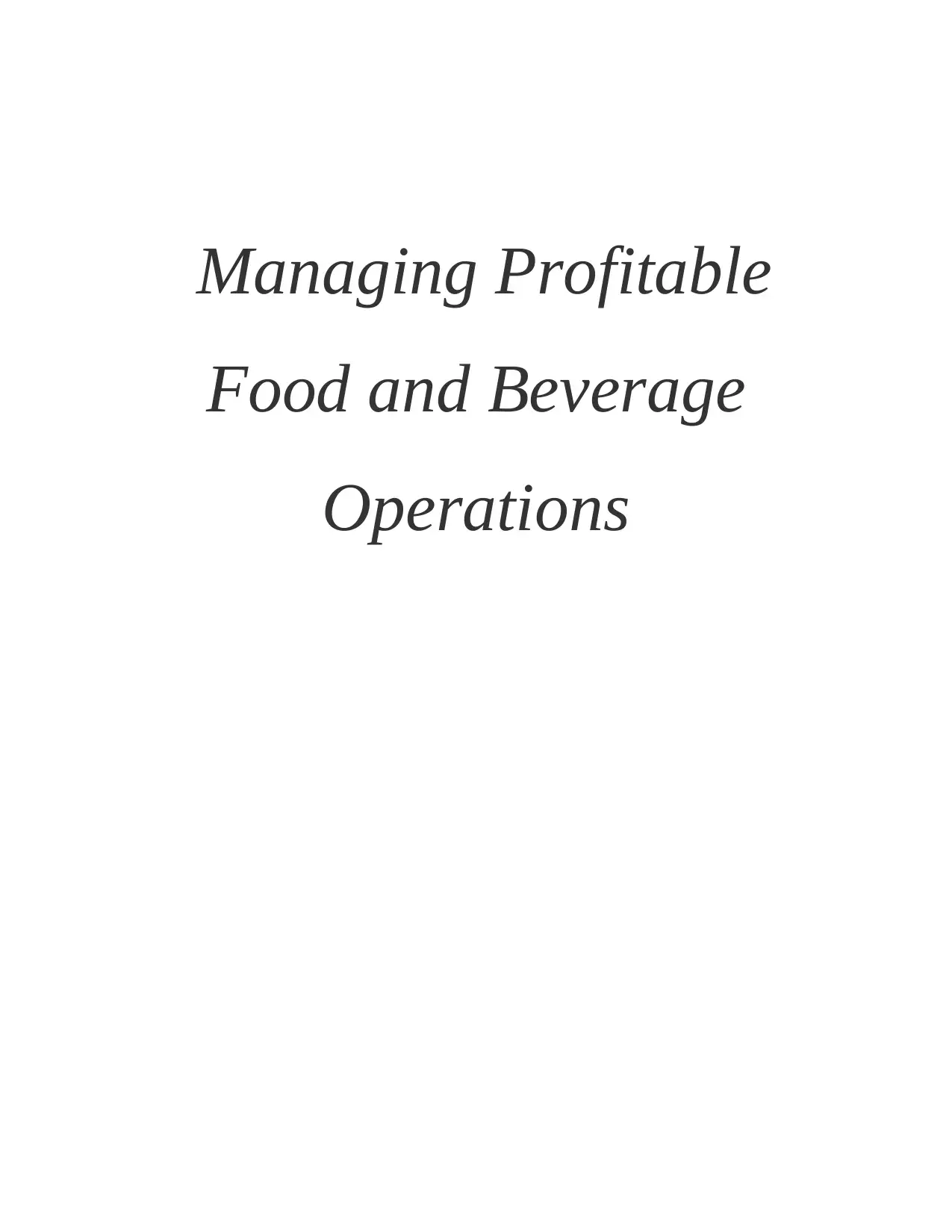
Managing Profitable
Food and Beverage
Operations
Food and Beverage
Operations
Paraphrase This Document
Need a fresh take? Get an instant paraphrase of this document with our AI Paraphraser
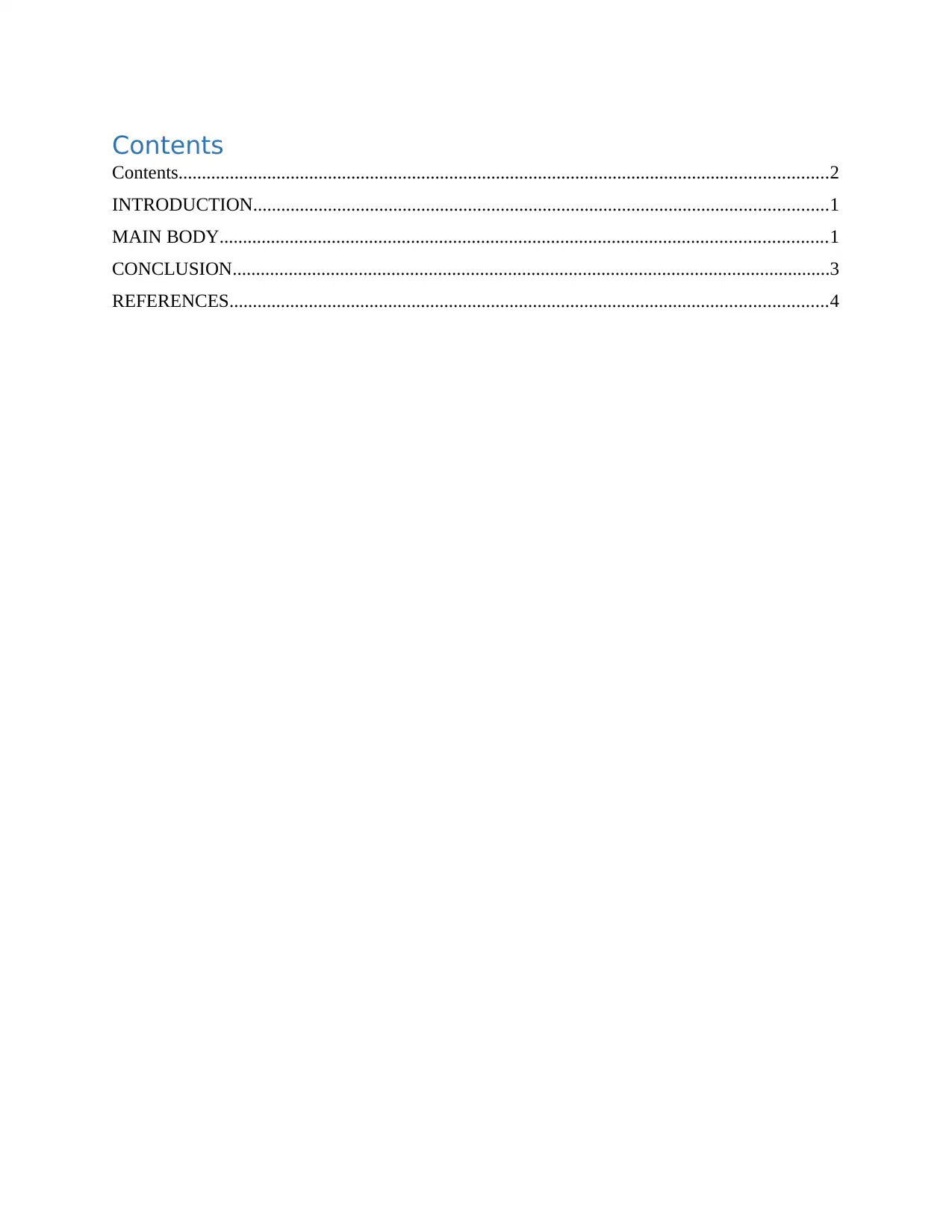
Contents
Contents...........................................................................................................................................2
INTRODUCTION...........................................................................................................................1
MAIN BODY..................................................................................................................................1
CONCLUSION................................................................................................................................3
REFERENCES................................................................................................................................4
Contents...........................................................................................................................................2
INTRODUCTION...........................................................................................................................1
MAIN BODY..................................................................................................................................1
CONCLUSION................................................................................................................................3
REFERENCES................................................................................................................................4
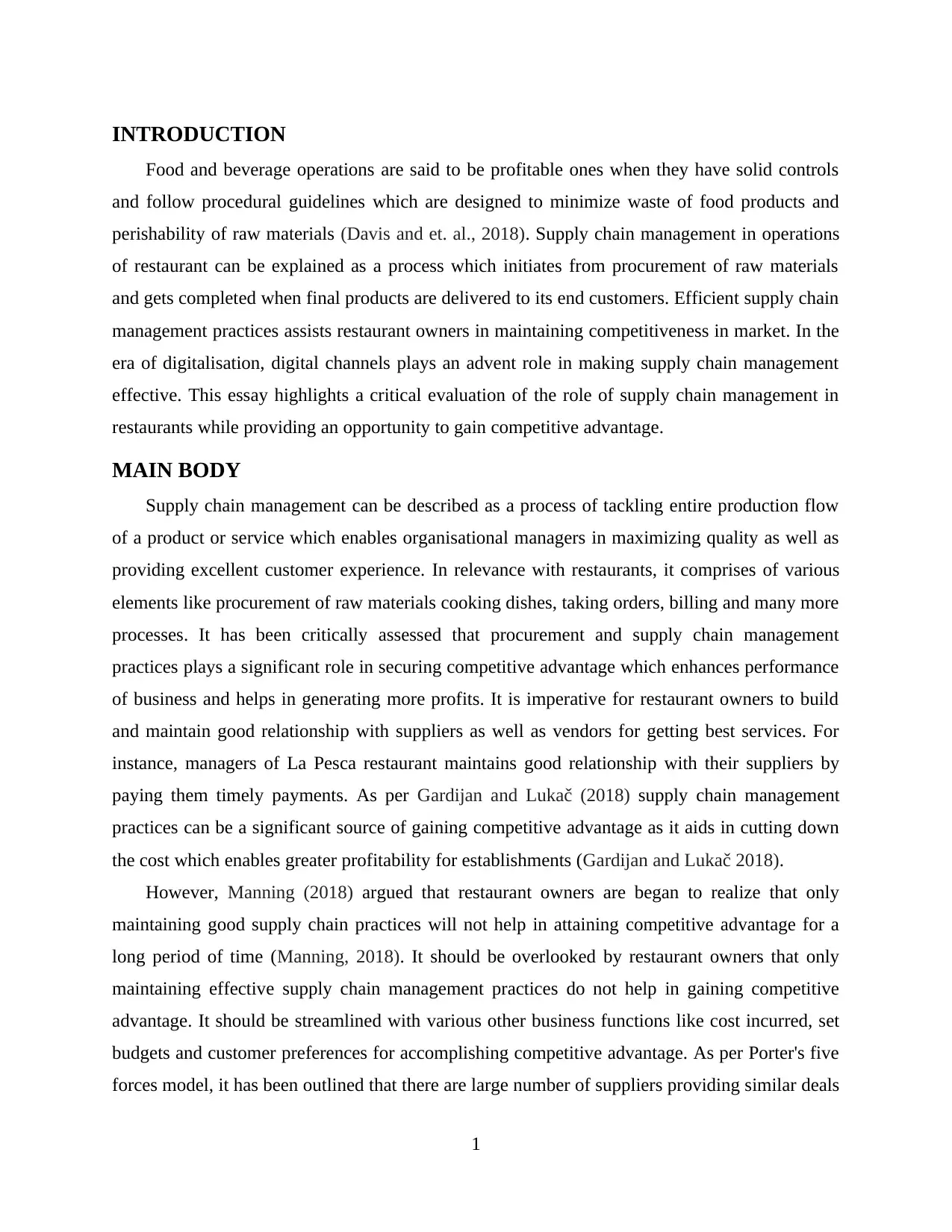
INTRODUCTION
Food and beverage operations are said to be profitable ones when they have solid controls
and follow procedural guidelines which are designed to minimize waste of food products and
perishability of raw materials (Davis and et. al., 2018). Supply chain management in operations
of restaurant can be explained as a process which initiates from procurement of raw materials
and gets completed when final products are delivered to its end customers. Efficient supply chain
management practices assists restaurant owners in maintaining competitiveness in market. In the
era of digitalisation, digital channels plays an advent role in making supply chain management
effective. This essay highlights a critical evaluation of the role of supply chain management in
restaurants while providing an opportunity to gain competitive advantage.
MAIN BODY
Supply chain management can be described as a process of tackling entire production flow
of a product or service which enables organisational managers in maximizing quality as well as
providing excellent customer experience. In relevance with restaurants, it comprises of various
elements like procurement of raw materials cooking dishes, taking orders, billing and many more
processes. It has been critically assessed that procurement and supply chain management
practices plays a significant role in securing competitive advantage which enhances performance
of business and helps in generating more profits. It is imperative for restaurant owners to build
and maintain good relationship with suppliers as well as vendors for getting best services. For
instance, managers of La Pesca restaurant maintains good relationship with their suppliers by
paying them timely payments. As per Gardijan and Lukač (2018) supply chain management
practices can be a significant source of gaining competitive advantage as it aids in cutting down
the cost which enables greater profitability for establishments (Gardijan and Lukač 2018).
However, Manning (2018) argued that restaurant owners are began to realize that only
maintaining good supply chain practices will not help in attaining competitive advantage for a
long period of time (Manning, 2018). It should be overlooked by restaurant owners that only
maintaining effective supply chain management practices do not help in gaining competitive
advantage. It should be streamlined with various other business functions like cost incurred, set
budgets and customer preferences for accomplishing competitive advantage. As per Porter's five
forces model, it has been outlined that there are large number of suppliers providing similar deals
1
Food and beverage operations are said to be profitable ones when they have solid controls
and follow procedural guidelines which are designed to minimize waste of food products and
perishability of raw materials (Davis and et. al., 2018). Supply chain management in operations
of restaurant can be explained as a process which initiates from procurement of raw materials
and gets completed when final products are delivered to its end customers. Efficient supply chain
management practices assists restaurant owners in maintaining competitiveness in market. In the
era of digitalisation, digital channels plays an advent role in making supply chain management
effective. This essay highlights a critical evaluation of the role of supply chain management in
restaurants while providing an opportunity to gain competitive advantage.
MAIN BODY
Supply chain management can be described as a process of tackling entire production flow
of a product or service which enables organisational managers in maximizing quality as well as
providing excellent customer experience. In relevance with restaurants, it comprises of various
elements like procurement of raw materials cooking dishes, taking orders, billing and many more
processes. It has been critically assessed that procurement and supply chain management
practices plays a significant role in securing competitive advantage which enhances performance
of business and helps in generating more profits. It is imperative for restaurant owners to build
and maintain good relationship with suppliers as well as vendors for getting best services. For
instance, managers of La Pesca restaurant maintains good relationship with their suppliers by
paying them timely payments. As per Gardijan and Lukač (2018) supply chain management
practices can be a significant source of gaining competitive advantage as it aids in cutting down
the cost which enables greater profitability for establishments (Gardijan and Lukač 2018).
However, Manning (2018) argued that restaurant owners are began to realize that only
maintaining good supply chain practices will not help in attaining competitive advantage for a
long period of time (Manning, 2018). It should be overlooked by restaurant owners that only
maintaining effective supply chain management practices do not help in gaining competitive
advantage. It should be streamlined with various other business functions like cost incurred, set
budgets and customer preferences for accomplishing competitive advantage. As per Porter's five
forces model, it has been outlined that there are large number of suppliers providing similar deals
1
⊘ This is a preview!⊘
Do you want full access?
Subscribe today to unlock all pages.

Trusted by 1+ million students worldwide
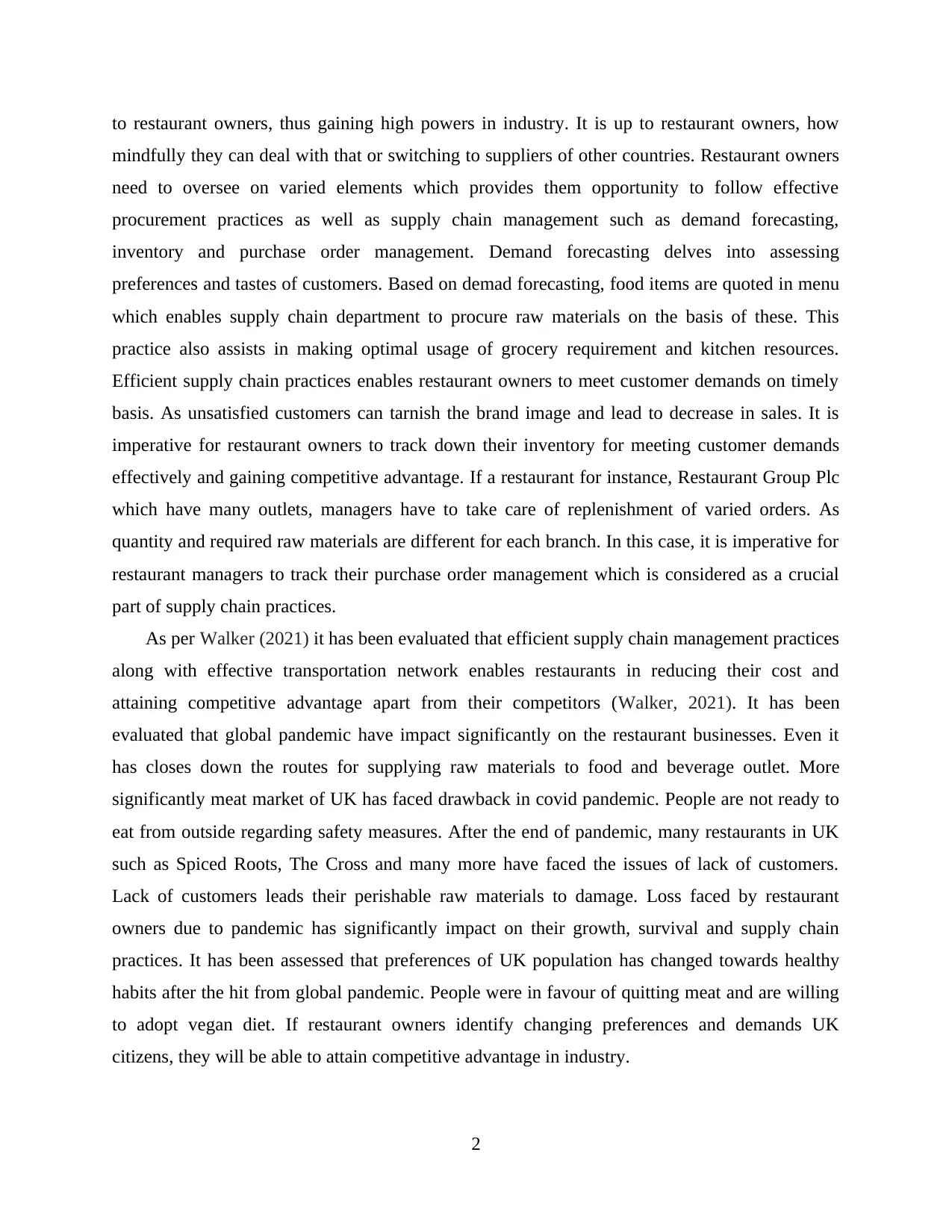
to restaurant owners, thus gaining high powers in industry. It is up to restaurant owners, how
mindfully they can deal with that or switching to suppliers of other countries. Restaurant owners
need to oversee on varied elements which provides them opportunity to follow effective
procurement practices as well as supply chain management such as demand forecasting,
inventory and purchase order management. Demand forecasting delves into assessing
preferences and tastes of customers. Based on demad forecasting, food items are quoted in menu
which enables supply chain department to procure raw materials on the basis of these. This
practice also assists in making optimal usage of grocery requirement and kitchen resources.
Efficient supply chain practices enables restaurant owners to meet customer demands on timely
basis. As unsatisfied customers can tarnish the brand image and lead to decrease in sales. It is
imperative for restaurant owners to track down their inventory for meeting customer demands
effectively and gaining competitive advantage. If a restaurant for instance, Restaurant Group Plc
which have many outlets, managers have to take care of replenishment of varied orders. As
quantity and required raw materials are different for each branch. In this case, it is imperative for
restaurant managers to track their purchase order management which is considered as a crucial
part of supply chain practices.
As per Walker (2021) it has been evaluated that efficient supply chain management practices
along with effective transportation network enables restaurants in reducing their cost and
attaining competitive advantage apart from their competitors (Walker, 2021). It has been
evaluated that global pandemic have impact significantly on the restaurant businesses. Even it
has closes down the routes for supplying raw materials to food and beverage outlet. More
significantly meat market of UK has faced drawback in covid pandemic. People are not ready to
eat from outside regarding safety measures. After the end of pandemic, many restaurants in UK
such as Spiced Roots, The Cross and many more have faced the issues of lack of customers.
Lack of customers leads their perishable raw materials to damage. Loss faced by restaurant
owners due to pandemic has significantly impact on their growth, survival and supply chain
practices. It has been assessed that preferences of UK population has changed towards healthy
habits after the hit from global pandemic. People were in favour of quitting meat and are willing
to adopt vegan diet. If restaurant owners identify changing preferences and demands UK
citizens, they will be able to attain competitive advantage in industry.
2
mindfully they can deal with that or switching to suppliers of other countries. Restaurant owners
need to oversee on varied elements which provides them opportunity to follow effective
procurement practices as well as supply chain management such as demand forecasting,
inventory and purchase order management. Demand forecasting delves into assessing
preferences and tastes of customers. Based on demad forecasting, food items are quoted in menu
which enables supply chain department to procure raw materials on the basis of these. This
practice also assists in making optimal usage of grocery requirement and kitchen resources.
Efficient supply chain practices enables restaurant owners to meet customer demands on timely
basis. As unsatisfied customers can tarnish the brand image and lead to decrease in sales. It is
imperative for restaurant owners to track down their inventory for meeting customer demands
effectively and gaining competitive advantage. If a restaurant for instance, Restaurant Group Plc
which have many outlets, managers have to take care of replenishment of varied orders. As
quantity and required raw materials are different for each branch. In this case, it is imperative for
restaurant managers to track their purchase order management which is considered as a crucial
part of supply chain practices.
As per Walker (2021) it has been evaluated that efficient supply chain management practices
along with effective transportation network enables restaurants in reducing their cost and
attaining competitive advantage apart from their competitors (Walker, 2021). It has been
evaluated that global pandemic have impact significantly on the restaurant businesses. Even it
has closes down the routes for supplying raw materials to food and beverage outlet. More
significantly meat market of UK has faced drawback in covid pandemic. People are not ready to
eat from outside regarding safety measures. After the end of pandemic, many restaurants in UK
such as Spiced Roots, The Cross and many more have faced the issues of lack of customers.
Lack of customers leads their perishable raw materials to damage. Loss faced by restaurant
owners due to pandemic has significantly impact on their growth, survival and supply chain
practices. It has been assessed that preferences of UK population has changed towards healthy
habits after the hit from global pandemic. People were in favour of quitting meat and are willing
to adopt vegan diet. If restaurant owners identify changing preferences and demands UK
citizens, they will be able to attain competitive advantage in industry.
2
Paraphrase This Document
Need a fresh take? Get an instant paraphrase of this document with our AI Paraphraser
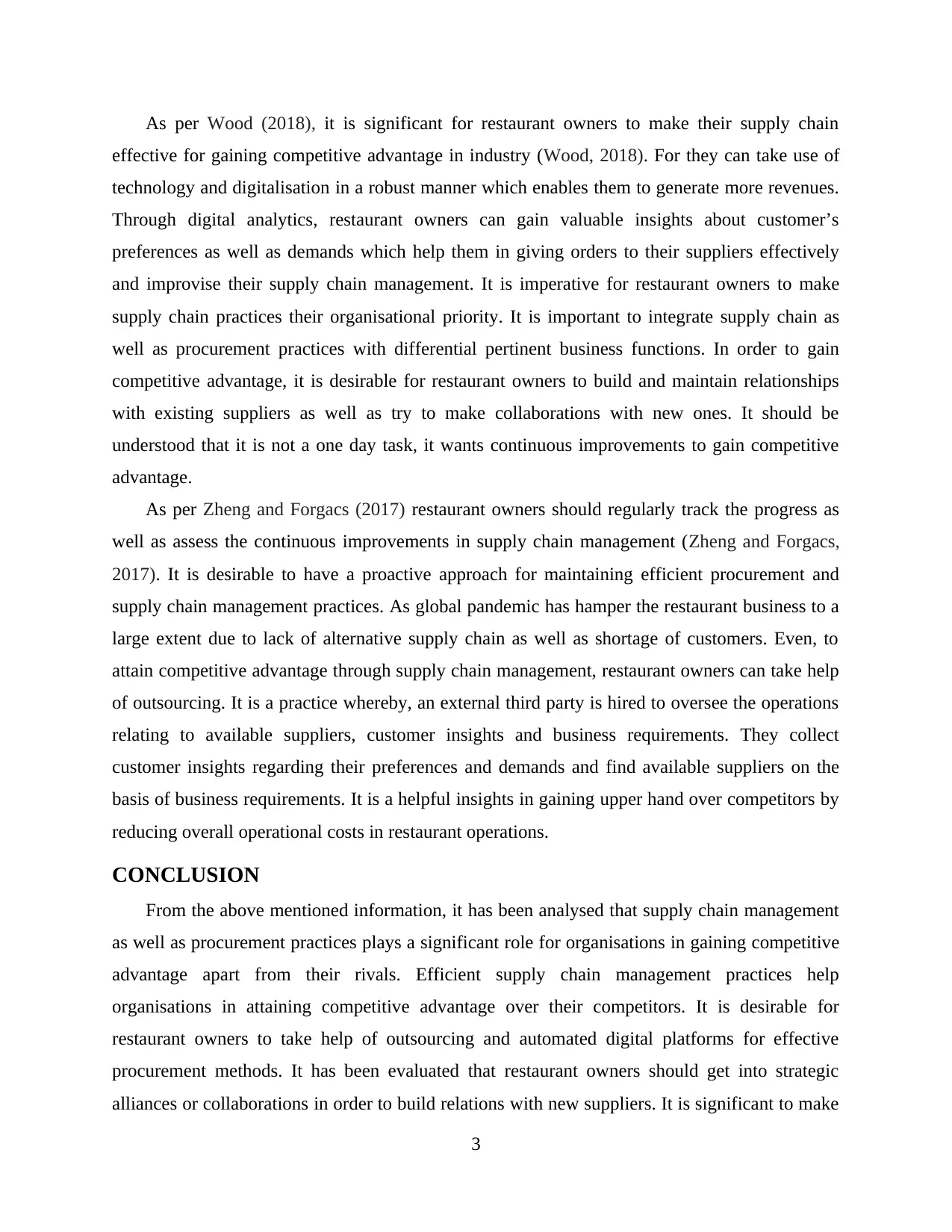
As per Wood (2018), it is significant for restaurant owners to make their supply chain
effective for gaining competitive advantage in industry (Wood, 2018). For they can take use of
technology and digitalisation in a robust manner which enables them to generate more revenues.
Through digital analytics, restaurant owners can gain valuable insights about customer’s
preferences as well as demands which help them in giving orders to their suppliers effectively
and improvise their supply chain management. It is imperative for restaurant owners to make
supply chain practices their organisational priority. It is important to integrate supply chain as
well as procurement practices with differential pertinent business functions. In order to gain
competitive advantage, it is desirable for restaurant owners to build and maintain relationships
with existing suppliers as well as try to make collaborations with new ones. It should be
understood that it is not a one day task, it wants continuous improvements to gain competitive
advantage.
As per Zheng and Forgacs (2017) restaurant owners should regularly track the progress as
well as assess the continuous improvements in supply chain management (Zheng and Forgacs,
2017). It is desirable to have a proactive approach for maintaining efficient procurement and
supply chain management practices. As global pandemic has hamper the restaurant business to a
large extent due to lack of alternative supply chain as well as shortage of customers. Even, to
attain competitive advantage through supply chain management, restaurant owners can take help
of outsourcing. It is a practice whereby, an external third party is hired to oversee the operations
relating to available suppliers, customer insights and business requirements. They collect
customer insights regarding their preferences and demands and find available suppliers on the
basis of business requirements. It is a helpful insights in gaining upper hand over competitors by
reducing overall operational costs in restaurant operations.
CONCLUSION
From the above mentioned information, it has been analysed that supply chain management
as well as procurement practices plays a significant role for organisations in gaining competitive
advantage apart from their rivals. Efficient supply chain management practices help
organisations in attaining competitive advantage over their competitors. It is desirable for
restaurant owners to take help of outsourcing and automated digital platforms for effective
procurement methods. It has been evaluated that restaurant owners should get into strategic
alliances or collaborations in order to build relations with new suppliers. It is significant to make
3
effective for gaining competitive advantage in industry (Wood, 2018). For they can take use of
technology and digitalisation in a robust manner which enables them to generate more revenues.
Through digital analytics, restaurant owners can gain valuable insights about customer’s
preferences as well as demands which help them in giving orders to their suppliers effectively
and improvise their supply chain management. It is imperative for restaurant owners to make
supply chain practices their organisational priority. It is important to integrate supply chain as
well as procurement practices with differential pertinent business functions. In order to gain
competitive advantage, it is desirable for restaurant owners to build and maintain relationships
with existing suppliers as well as try to make collaborations with new ones. It should be
understood that it is not a one day task, it wants continuous improvements to gain competitive
advantage.
As per Zheng and Forgacs (2017) restaurant owners should regularly track the progress as
well as assess the continuous improvements in supply chain management (Zheng and Forgacs,
2017). It is desirable to have a proactive approach for maintaining efficient procurement and
supply chain management practices. As global pandemic has hamper the restaurant business to a
large extent due to lack of alternative supply chain as well as shortage of customers. Even, to
attain competitive advantage through supply chain management, restaurant owners can take help
of outsourcing. It is a practice whereby, an external third party is hired to oversee the operations
relating to available suppliers, customer insights and business requirements. They collect
customer insights regarding their preferences and demands and find available suppliers on the
basis of business requirements. It is a helpful insights in gaining upper hand over competitors by
reducing overall operational costs in restaurant operations.
CONCLUSION
From the above mentioned information, it has been analysed that supply chain management
as well as procurement practices plays a significant role for organisations in gaining competitive
advantage apart from their rivals. Efficient supply chain management practices help
organisations in attaining competitive advantage over their competitors. It is desirable for
restaurant owners to take help of outsourcing and automated digital platforms for effective
procurement methods. It has been evaluated that restaurant owners should get into strategic
alliances or collaborations in order to build relations with new suppliers. It is significant to make
3

right choice of vendors or suppliers for maintaining quality of inputs and gaining efficiency in
operations. It is imperative to set purchase order to suppliers by assessing their budgets.
4
operations. It is imperative to set purchase order to suppliers by assessing their budgets.
4
⊘ This is a preview!⊘
Do you want full access?
Subscribe today to unlock all pages.

Trusted by 1+ million students worldwide
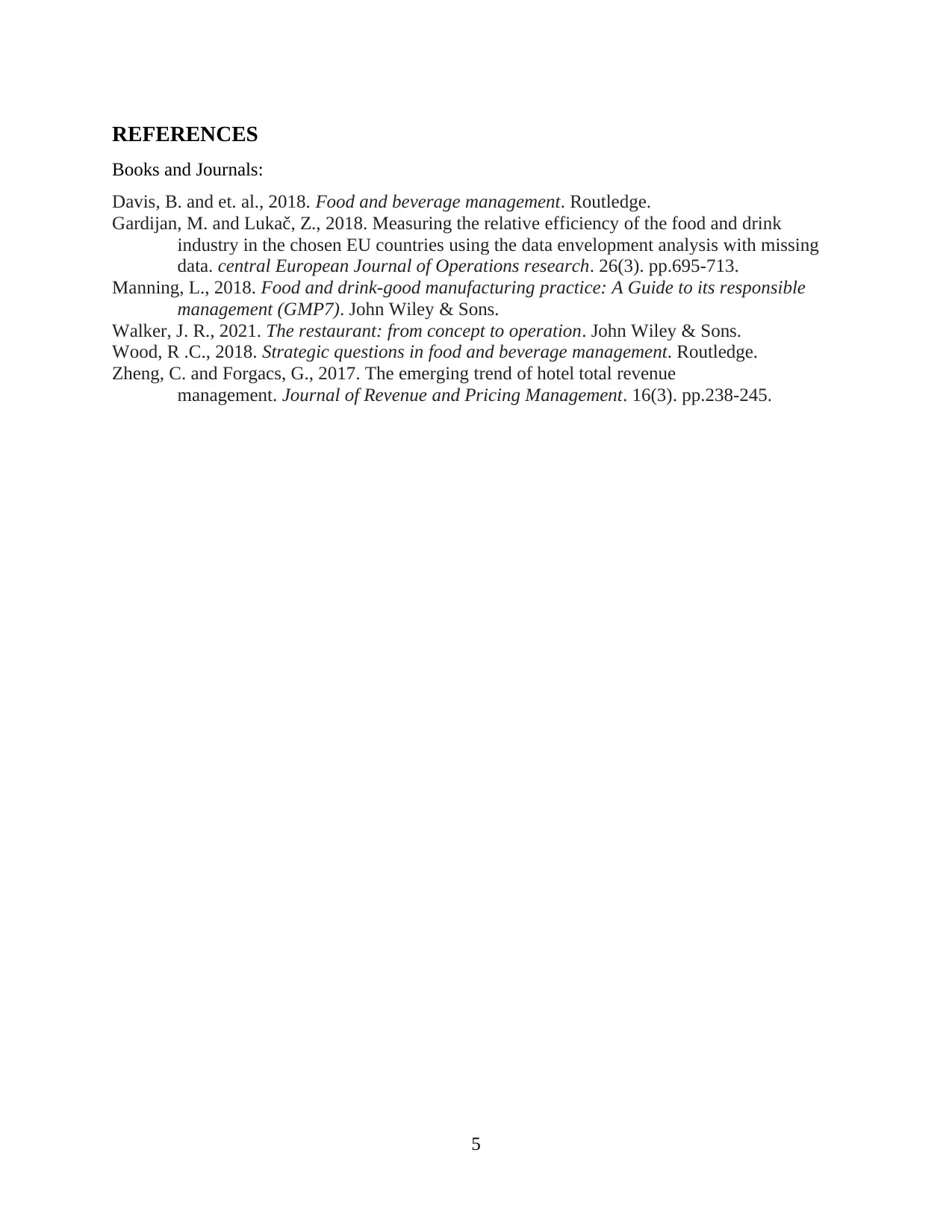
REFERENCES
Books and Journals:
Davis, B. and et. al., 2018. Food and beverage management. Routledge.
Gardijan, M. and Lukač, Z., 2018. Measuring the relative efficiency of the food and drink
industry in the chosen EU countries using the data envelopment analysis with missing
data. central European Journal of Operations research. 26(3). pp.695-713.
Manning, L., 2018. Food and drink-good manufacturing practice: A Guide to its responsible
management (GMP7). John Wiley & Sons.
Walker, J. R., 2021. The restaurant: from concept to operation. John Wiley & Sons.
Wood, R .C., 2018. Strategic questions in food and beverage management. Routledge.
Zheng, C. and Forgacs, G., 2017. The emerging trend of hotel total revenue
management. Journal of Revenue and Pricing Management. 16(3). pp.238-245.
5
Books and Journals:
Davis, B. and et. al., 2018. Food and beverage management. Routledge.
Gardijan, M. and Lukač, Z., 2018. Measuring the relative efficiency of the food and drink
industry in the chosen EU countries using the data envelopment analysis with missing
data. central European Journal of Operations research. 26(3). pp.695-713.
Manning, L., 2018. Food and drink-good manufacturing practice: A Guide to its responsible
management (GMP7). John Wiley & Sons.
Walker, J. R., 2021. The restaurant: from concept to operation. John Wiley & Sons.
Wood, R .C., 2018. Strategic questions in food and beverage management. Routledge.
Zheng, C. and Forgacs, G., 2017. The emerging trend of hotel total revenue
management. Journal of Revenue and Pricing Management. 16(3). pp.238-245.
5
1 out of 7
Related Documents
Your All-in-One AI-Powered Toolkit for Academic Success.
+13062052269
info@desklib.com
Available 24*7 on WhatsApp / Email
![[object Object]](/_next/static/media/star-bottom.7253800d.svg)
Unlock your academic potential
Copyright © 2020–2025 A2Z Services. All Rights Reserved. Developed and managed by ZUCOL.





